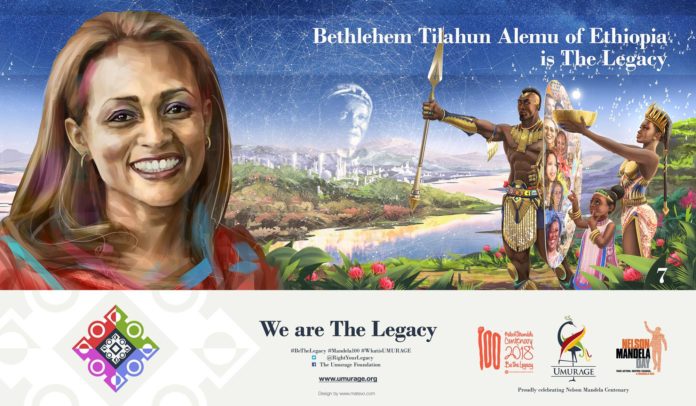Imagine you were born in a poor neighbourhood in eastern Africa. A neighbourhood so poor, people couldn’t afford shoes and had to make them themselves out of anything they could find: rubber, car tires. Imagine you vowed to change this situation. Imagine you created a company in that very poor environment, making a redesigned version of the recycled tire sole shoe worn by Ethiopians with modest means. Would that crazy idea of selling shoes made of tire attract clients? Would that be ‘the idea’ to alleviate poverty in your community or will you have to think of something else?
Today, I am inspired by Bethlehem Tilahun Alemu of Ethiopia. Bethlehem was born in 1980 in Addis Ababa, in the neighborhood called Zenebework. Zenebework has a very peculiar history. In the 1930s, a hospital for the treatment of contagious disease was created by the Emperor Haile Selassie and named after Princess Zenebework, one of his daughters. Patients would come from the whole country to seek treatment. Once cured, instead of going back home to their villages, they would settle in the immediate vicinity of the hospital and even call for their families to join them. Though the socio-economic make of Zenebework community has changed over the last eight decades since its creation, it is still amongst the poorest neighbourhoods in the Ethiopian capital.
Bethlehem was the eldest child of four siblings, and both her parents worked at the local hospital. Though she was the only girl in the family, their parents raised them all the same. When it came to house chores, there weren’t chores for the boys and chores for the girl. For Bethlehem that way of bringing her up gave her a lot of confidence in herself, she never had a moment in her life where she doubted of her ability to do everything her make counterparts could do.
Bethlehem completed both her primary and secondary school in Zenebework before enrolling at Unity University, Ethiopia’s first a private university, to study accounting.
Ever since she was a little girl, Bethlehem was sensitive to the stigma of poverty and the way her neighbours seemed unable to have a decent life.
“I grew up in a village of 5000 people. People were working the whole day but making very little money. I knew I had to do something about it.”
She had no doubt that creating better jobs for her neighbours could be the only way to help people in her community get out of poverty. In 2005, one year after finishing school, she decided to go back to her community to create a business.
As she knew she wasn’t eligible to get a loan, she approached a program supporting women entrepreneurship, but she couldn’t convince them to support her either. Bethlehem raised whatever capital she could get from her husband and immediate family, mobilized her community and started a workshop on a piece of land she received from her grand-mother. Her idea was to put to beneficial use her neighbours’ craftmanship.
“The first idea that came to my mind was to use recycled tires to, to use them as shoes. These recycled tires were made and worn by Ethiopian rebels and people are still using them now because they are affordable and durable.”
She was referring to the rebels who fought and defeated western powers who tried to colonize her country. The question was how to make them fancier, more attractive to the public. She decided to hire two artisans, a shoemaker and a craftsman who was used to work with different fabrics, so she could combine their different skillsets in the making of her shoes.
She gave her company the bold name ‘SoleRebels’, a tribute to those courageous Ethiopian rebels of the 1890s.
“People say that you need to spend 10,000 hours in your company. For me, I would say I spent 40 000 hours. I would spend hours trying to figure out what is going on in my company, how to win a market, how to create jobs.”
Bethlehem was not planning on selling her shoes in Ethiopia as she knew she would have a hard time competing with the cheap shoes mass-produced overseas that flooded the local market. Instead, her idea was to target the overseas markets, because there, her shoes would just be one brand among others, plus she would have the added advantage to offer a niche product to a clientele that could afford to pay extra for a brand with a story.
You’re probably wondering how was she going to sell shoes overseas when she could barely raise the money to build her workshop? Well, her idea was simple yet quite revolutionary in Ethiopia in those days: she was going to sell her shoes online, using international e-commerce outlets such as Amazon.
A rebel and a pioneer!
The brand was immediately embraced in Europe and the US, and the market expanded in time to Asia. A real success!
It wasn’t an easy ride still. One of her hardest battles was to fight for her industrial property: in 2013 she discovered that a foreign company had created a website with her company’s name and was selling imitations of her products online!
She brought the domain name dispute to arbitration and won the case.
“It isn’t the first time someone has tried to threaten our Intellectual Property and we know it won’t be the last. But at least the record is clear – mess with our brand and we will take action against you. And win. For Ethiopia and Africa to truly prosper, creating potent homegrown globally successful brands is key and protecting those brands is an equally crucial piece of that endeavour.”
Another challenge was to ensure all orders came from legit businesses who would respect the payments terms. There were times where some companies received their order but made all sorts of excuses not to pay, taking advantage of the fact that she was not going to be able to travel all the way to claim her due. One company even disappeared after they received their order and others would not wire the payment, under the pretext that Ethiopia was not safe enough to receive wire-transfers. Yet, it was safe enough to receive a full order of hundreds of shoes from!
But rest assured, our fighter managed to stay afloat and even expand her business. Today, in just just 13 years of existence, the eco-friendly SoleRebels shoes – which started with herself, her husband, her teenage brother and two artisans – employs more than 300 people, makes 70,000 pairs of shoes a year, and has 18 stores around the world, including in the US, Japan, Singapore, Austria, Greece, Spain and Switzerland. Her e-commerce marketing strategy allows her to over 30 countries around the world.
In 2015, Bethlehem launched a new venture, Republic of Leather, which offers hand crafted high-end leather wear and accessories. In 2016 she launched a coffee venture, the Garden of Coffee, with which she ambitions to create more jobs and take Ethiopian coffee to the world in the same fashion she did with her shoes.
One more thing you need to know about the self-made social entrepreneur: she doesn’t like when people ask her what it means to be a woman entrepreneur!
“I never think that because I am a woman, I cannot do this, I am not going to do. The way I see myself, I am a person, I am capable to do whatever I want. And I am going to succeed, because I am going to work really hard to be there each and every day. For African women and African girls who say, ‘I am not capable of doing this’, you are kidding yourself. We have to stop talking about ‘women empowerment’, because we create without realising it a thinking in girls and women’s minds that they need some type of help to move ahead.”
I hope she won’t mind if, still, we stress that she was the first female African entrepreneur to address the Clinton Global Initiative? And that in 2011, she was dubbed as an Outstanding African Business Woman by African Business Awards?
The same year, she was named Young Global Leader by the World Economic Forum. In 2012, Bethlehem was included on Forbes ‘100 Most Powerful’ and profiled as a “Woman to Watch”, she was named by Business Insider as one of “Africa’s Top 5 Female Entrepreneurs”, was chosen as NYC Venture Fellow by Mayor Bloomberg and as one of Arise Magazine’s “100 Dynamic Women who are shaping modern Africa.”
In 2013, she was listed by Fast Company as one of the “100 Most Creative People in Business 2013” and by Madame Figaro as one of “15 Most Powerful African Women.” In addition, Bethlehem was chosen by The Guardian as one of “Africa’s Top Women Achievers” and by CNN as one of the “12 Female Entrepreneurs Who Changed the Way We Do Business.”
Bethlehem was chosen to join the advisory board of the Green Industry Platform, convened by the United Nations Industrial Development Organization and the UN Environment Program. She also serves as a UN Goodwill Ambassador for Entrepreneurship also sits on the board of United Nations Industrial Development Organisation (UNIDO).
“I have a story to tell. I started something from scratch and I am very proud of what I’ve done, what have been achieved. It’s not a story that was written for me, it’s my own story, I live that. I am passionate about it and I am always happy to share that if that’s going to support young people and I am going to continue do that.”
Right Your Legacy Bethlehem! You are the Legacy! #BeTheLegacy#WeAreTheLegacy #Mandela100 #WhatisUMURAGE
Contributors
Um’Khonde Habamenshi
Lion Imanzi
































































